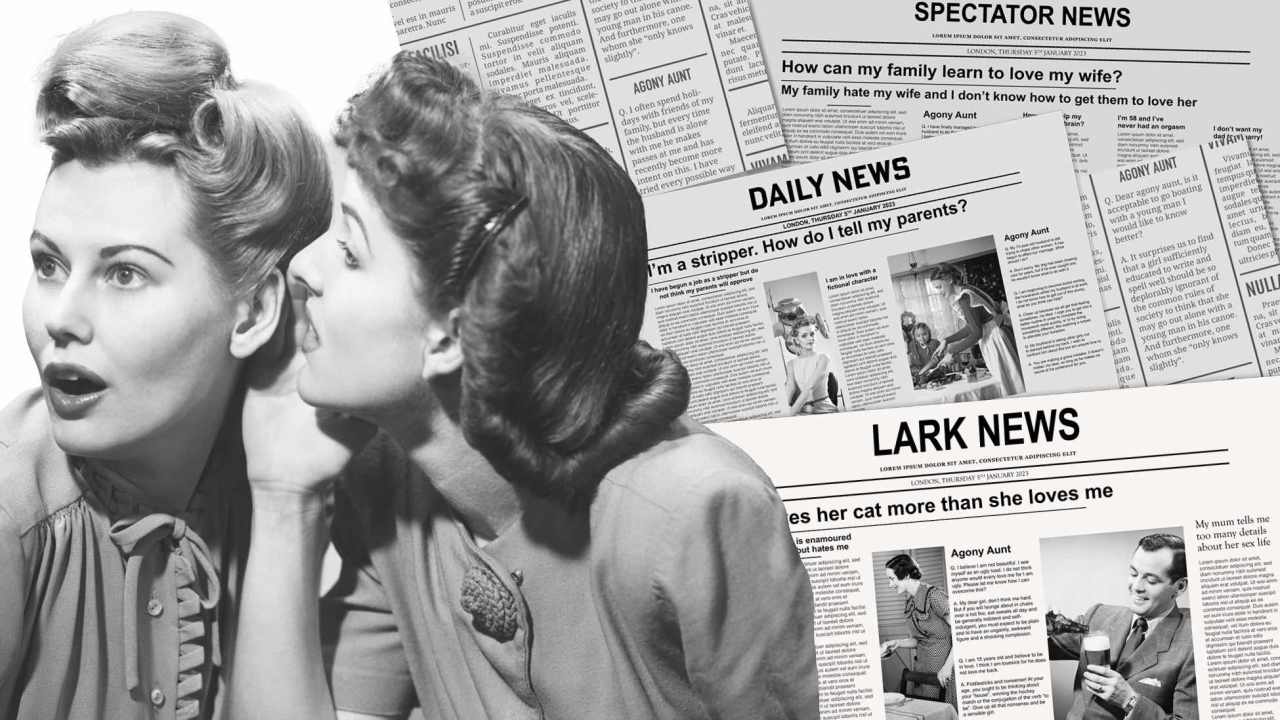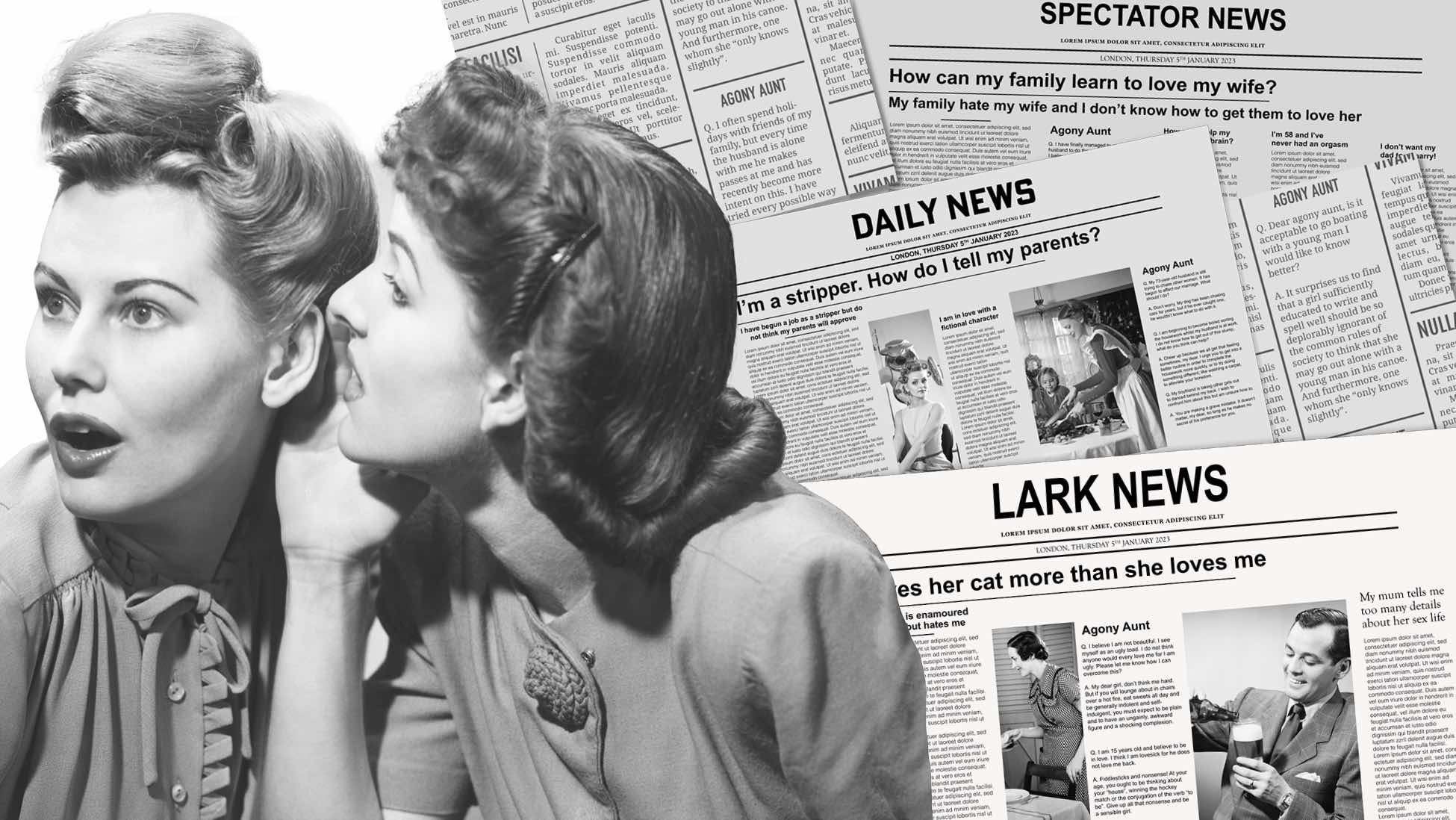What better barometer of the nation’s psyche could there be than the questions in an agony aunt’s postbag – and the answers they receive? ‘My transgender brother is furious over my choice of baby name’, ‘My Remainer husband is refusing to get a new passport’ and ‘My leftie wife is condescending and annoying’ are just a few of the timely examples from one recent broadsheet column.
These days, many responses to such dilemmas are variations on ‘Live your truth’ (in other words, do and say whatever makes you happy) – which may go some way towards explaining why agony aunts are no longer the essential reading they once were.
Although advice columns have been around for centuries – the first ones appeared in 1691 in the periodical Athenian Mercury and were supposedly run past a panel of moral ‘experts’ – the sympathetic agony aunt is a very modern invention. In the golden age of the problem page, which really started in the Victorian era when education laws meant more people could read, agony aunts’ main job was to uphold the nation’s standards, not soothe the feelings of correspondents.
In 1859, a new bride who wrote to the Weekly Magazine about a row with her husband which erupted because she was too busy writing poetry to have his dinner on the table is told to forget her muse: ‘your first duty is now to your husband’ and ‘a man’s heart lives very near his stomach’. If correspondents put a foot wrong, their letters might be answered with hectoring rants or dismissed with withering put-downs. You risked being branded naive, beyond help or, at worst, immoral.
To a girl in 1895 who asked in Girl’s Own Paper if it was acceptable to go boating with a young man she’d like to know better: ‘It surprises us to find that a girl sufficiently educated to write and spell well should be so deplorably ignorant of the common rules of society to think that she may go out alone with a young man in his canoe. And furthermore, one whom she “only knows slightly”.’
Sympathy was in short supply. To a young woman so insecure about her looks that she referred to herself as ‘an ugly toad’ in her letter to Woman’s Life in 1902: ‘My dear girl, don’t think me hard. But if you will lounge about in chairs over a hot fire, eat sweets all day and be generally indolent and self-indulgent, you must expect to be plain and to have an ungainly, awkward figure and a shocking complexion.’
The most natural of feelings could be summarily dismissed, too. To a 15-year-old schoolgirl who felt lovesick, a 1933 agony aunt blasted this response: ‘Fiddlesticks and nonsense! At your age, you ought to be thinking about your “house”, winning the hockey match or the conjugation of the verb “to be”. Give up all that nonsense and be a sensible girl.’
Our historic trust in authority may explain why suffering correspondents put such faith in the agony aunts of their favourite publications, despite the fact they rarely knew anything about them since most wrote under pseudonyms. And yet it was these faceless counsellors who also kept women in their place, even after the birth of the suffragette movement. To a woman who boasted that she had managed to persuade her husband to do the washing up in 1929, one agony aunt replied: ‘I have difficult replying civilly because you, who is so proud of her conduct, ought to be ashamed of it. You are an imposter of the worst kind. In my opinion there are plenty of criminals who are serving sentences who are not half so wicked.’
Even in the 1950s, if a husband showed no interest in his wife, she was told it was her fault. One correspondent was asked what else she expected if the man of the house did not come home to find her looking ‘dressed and pretty’ and she was instead all ‘face creams and curlers’? But while all of the advice was delivered with imperious certainty, a lot was just plain wrong. An overweight reader is advised to try rolling on the ground as if this would miraculously whittle off the pounds. Another woman fretting about her weight is urged to visit a museum, because intellectual exercise burned as much fat as a walk in the Alps.
Yet as lacking in scientific understanding as we now know this advice to be, the letters are also delightfully free from the health and safety guidance which constrains today’s world. A man who wants to learn how to swim in 1859, for example, is cheerfully advised to test whether he would sink or not by throwing an egg into some deep water and launching himself after it.
‘My dear girl, if you will lounge about and eat sweets all day, you must expect to have an ungainly figure’
When it came to sex, agony aunts also seemed to think it was their job to repress rather than to liberate. Only genteel questions could be published and columnists would respond to anything sexual privately, in plain brown envelopes. Agony aunt Peggy Makins, who wrote under the name Evelyn Home for Woman magazine from the 1920s to the 1970s, revealed that the word ‘bottom’ was forbidden on her page, even if it referred to the ‘bottom of the garden’.
After the sexual revolution of the 1960s, as the morals and rules we once lived by gradually shifted, the type of agony aunts who saw it as their jobs to keep readers in line became redundant. Writers such as Marje Proops led the way by talking with a newfound directness about sex. Human nature hadn’t changed, only the rules and expectations that governed it.
Yet no matter how unsympathetic or, at times, simply incorrect the counsel was, it’s hard not to admire the gloriously high-handed way strict agony aunts dealt with their readers’ problems. At times, the extracts are an icy cold and, dare I say it, even refreshing counterblast to some of today’s pussy-footing, politically correct advice. They are a throwback to a time when if you did or said something considered silly, you got a brisk telling-off and reminder to pull yourself together – not a referral for therapy.







Comments